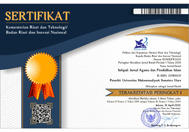Islamic Education in Gender Perspective (Historical, Sociological, Political, Economic and Management Review)
Abstract
This paper aims to: (1) describe equality and justice from a gender perspective; (2) describe gender from the perspective of Islamic education; (3) analyzing women's prospects from the perspective of gender and Islamic education, in relation to history, sociology, politics, economics and management. The central problem of this paper is how to interpret gender equality from an Islamic education perspective. The research method used is descriptive qualitative research with the type of library research. The research results show that: (1) gender is a social concept used to see the differences between men and women. Feminists are concerned about seeing women who are oppressed with various negative views towards them such as violence, stereotypes, subordination and marginalization, feminists demand to fight for the elimination of these negative views and provide space for women to participate in the social field just like men; (2) Islamic education is an activity that seeks to develop and actualize human potential through adaptation to the family, school and community environment based on Islamic values. Islamic education aims to make humans into caliphs who always understand their position as servants and always dedicate themselves based on what Allah commands. Therefore, anyone can and has the right to actualize their potential regardless of biological sex; (3) gender in the perspective of Islamic education, trying to position humans as students or educational actors who have the desire to progress. Men and women have equal rights to actively participate in the field of education. This article has implications: (1) everyone must respect equality and equal rights as servants of Allah SWT. without biological discrimination. Islamic education respects a person's humanity in an egalitarian manner; (2) men and women work arm in arm to create the rhythm of harmony in diversity to obtain goodness within the framework of the principle of mawaddah wa rahmah; (3) the need for a reinterpretation of teachings that is free from subjective elements and gender bias, so that religion does not become a scapegoat for perpetuating gender inequality, both patriarchal and other socio-cultural biases; (4) for decision makers in the field of education to provide opportunities and access to anyone, both men and women, as long as the opportunities exist and meet the criteria that are free from discrimination based on natural considerations; (5) continuous education, training and dissemination need to be implemented so that understanding of gender equality in education can be well socialized in all segments of society so as to create gender equality.
Keywords
Full Text:
PDFReferences
Hasanah, M. dan M. A. Maa’rif. (2021). Solusi Pendidikan Agama Islam Mengatasi Kenakalan Remaja pada Keluarga Broken Home. Attadrib: Jurnal Pendidikan Guru Madrasah Ibtidaiyah. 4(1), 39-49.
Widianti, A. (2005). Hukum Berkeadilan Gender. Jakarta: Kompas.
Shihab, Q. (2007). Wawasan Al-Qur’an. Bandung: PT. Mizan Pustaka.
Engineer, A. A. (2013). Islam dan Pembebasan. Yogyakarta: PT. LkiS Printing Cemerlang.
Umar, N. (2010). Argumen Kesetaraan Gender Perspektif Al-Qur’an. Jakarta: Dian Rakyat.
Efendy, R. (2014). Kesetaraan Gender dalam Pendidikan. Jurnal Al-Maiyyah, 7(2), 142-163.
Mutawakkil, H. M. (2014). Keadilan Islam dalam Persoalan Gender. Jurnal KALIMAH, 12(1), 64-89.
Suhra, S. (2013). Kesetaraan Gender dalam Prespektif Al-Qur’an dan Implikasinya Terhadap Hukum Islam. Jurnal Al-Ulum, 13(2), 373-394.
DOI: https://doi.org/10.30596/18051
Refbacks
- There are currently no refbacks.
Intiqad Jurnal Agama dan Pendidikan Islam is abstracting & indexing in the following databases:
View My StatsEditorial Address:
Faculty of Islamic Religion, Universitas Muhammadiyah Sumatera Utara. Jl. Mukhtar Basri No. 3 Medan 20238 Telp. (061) 6622400 ext. 27 dan 28 Fax. (061) 6625474. e-mail: intiqad@umsu.ac.id

_(1).png)























